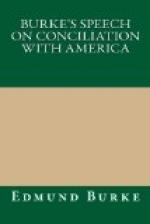He attracted the attention of literary men. Dr. Johnson had just completed his famous dictionary, and was the centre of a group of writers who accepted him at his own valuation. Burke did not want for company, and wrote copiously.[Footnote: Hints for an Essay on the Drama. Abridgement of the History of England] He became associated with Dodsley, a bookseller, who began publishing the Annual Register in 1759, and was paid a hundred pounds a year for writing upon current events. He spent two years (1761-63) in Ireland in the employment of William Hamilton, but at the end of that time returned, chagrined and disgusted with his would-be patron, who utterly failed to recognize Burke’s worth, and persisted in the most unreasonable demands upon his time and energy.
For once Burke’s independence served him well. In 1765 Lord Rockingham became prime minister, and Burke, widely known as the chief writer for the Annual Register, was free to accept the position of private secretary, which Lord Rockingham was glad to offer him. His services here were invaluable. The new relations thus established did not end with the performance of the immediate duties of his office, but a warm friendship grew up between the two, which lasted till the death of Lord Rockingham. While yet private secretary, Burke was elected to Parliament from the borough of Wendover. It was through the influence of his friend, or perhaps relative, William Burke, that his election was secured.
Only a few days after taking his seat in the House of Commons, Burke made his first speech, January 27, 1766. He followed this in a very short time with another upon the same subject—the Taxation of the American Colonies. Notwithstanding the great honor and distinction which these first speeches brought Burke, his party was dismissed at the close of the session and the Chatham ministry formed. He remained with his friends, and employed himself in refuting [Footnote: Observations on the Present State of the Nation] the charges of the former minister, George Grenville, who wrote a pamphlet accusing his successors of gross neglect of public duties.
At this point in his life comes the much-discussed matter of Beaconsfield. How Burke became rich enough to purchase such expensive property is a question that has never been answered by his friends or enemies. There are mysterious hints of successful speculation in East India stock, of money borrowed, and Burke himself, in a letter to Shackleton, speaks of aid from his friends and “all [the money] he could collect of his own.” However much we may regret the air of mystery surrounding the matter, and the opportunity given those ever ready to smirch a great man’s character, it is not probable that any one ever really doubted Burke’s integrity in this or any other transaction. Perhaps the true explanation of his seemingly reckless extravagance (if any explanation is needed) is that the conventional standards of his time forced it upon him; and it may be that Burke himself sympathized to some extent with these standards, and felt a certain satisfaction in maintaining a proper attitude before the public.




